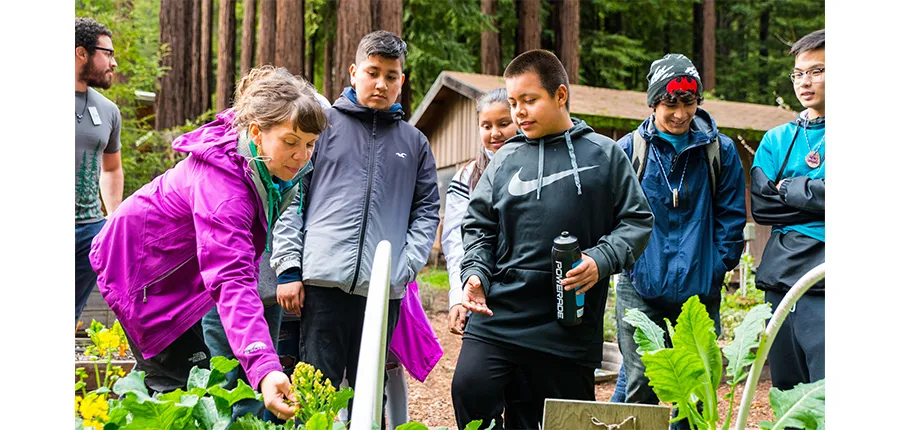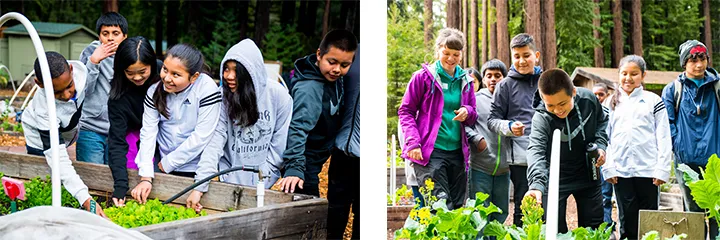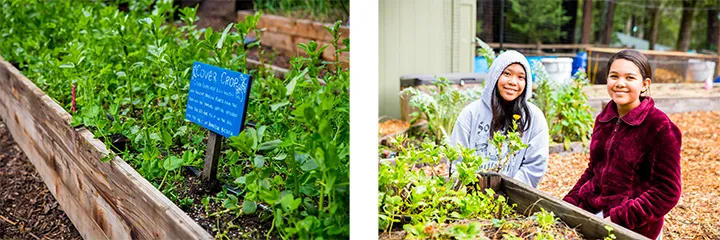Q&A with YMCA Camp Campbell’s Garden Manager Sasha Retford Gonzalez
Camp Campbell’s Garden Manager, Sasha Retford Gonzalez, is passionate about sharing her enthusiasm for gardening and the outdoors with every youth, adult, and family that enters Camp Campbell. From Outdoor Science School students and teachers, to family camp participants, to summer resident camp kids and more, Sasha hopes to spark a love for fresh produce and an appreciation for the process of growing food in each camp guest.
Q: What lessons does the garden teach?
We try to help them to see things that are planted in there were planted by kids that came earlier in the school year, to understand the time things take to come to fruition. When they are doing projects, like if they are planting seeds or preventing redwood roots from growing into the garden beds, they realize the depth of the soil. There are roly-polies, worms, and centipedes and there’s this whole life existing in the soil. We don’t often walk around thinking, ‘the soil beneath my feet is alive.’
When you start digging into the soil, it broadens your view.
With composting we try to teach about environmental responsibility, but we’re really careful to realize that like some of the things they see might be harder for them to do at home. But it’s still an exposure to an idea that maybe they’ve not seen before or thought of before. A lot of people just throw food waste in a trashcan, without thinking about where it goes or what happens to it next. When they look in the compost, kids recognize the banana peel from breakfast and understand the things they helped to put in there.
Q: Do garden experiences make people more willing to try foods that they weren’t interested in before?
Yes, definitely. Definitely. So often there’s kids, or even staff members or adults that will be like, oh, I don’t like tomatoes.
We always encourage people to try it, and many will say, ‘WOW, this tastes so different than what you find in a grocery store’, and it totally changes their mind about the food.
Right now we have broccoli and things like that where sometimes kids might be a little less excited about eating it, but when they’re out in the garden and they get to pick it themselves, they’re often more willing to try those things. In addition to letting people try food out in the garden, we harvest for the kitchen. We’ve been harvesting a lot of leafy greens for the salad bar. It’s so fun because they’ll see it out here [in the garden] and then they’ll go in for lunch and then they’ll see it and say, ‘I tasted that or I saw that out in the garden.’ It’s really good at making that connection.
Q: How does Camp Campbell offer youth new experiences?
We have a huge diversity of students that come up here from various background. In general gardening helps to teach them about community. We really strive to make sure everyone feels welcome and included.
Everyone takes on different roles while all contributing to the group.
YMCA Camp Campbell provides a space where youth can feel taken care of. They know that they’re going to get three meals and they have really lovely cabins to sleep in and a chance to bond with their friends and then also get to know students from a different school. That’s a cool opportunity to expand their horizons a little bit.
Youth get to try new things when they’re up here. A lot of kids have never been in a redwood forest before, even those who may live in San Jose. And it’s not that far, you know, but it just depends on what you have access to or what your family might be interested in.
Another really powerful thing that happens both in the garden and out on trial, is that we try to really make learning fun. It’s not sitting at a desk. They get to be hands on and asking questions. We encourage their curiosity and practicing their observation skills. Camp brings science to life and makes it really exciting.
Q: What’s next for the garden program at YMCA Camp Campbell?
We have 30 fruit trees, most of them are apple trees, a handful of pears, and a handful of citrus that are just reaching the age where they can produce fruit. In the future the kids could go and help harvest fruits for their own snack time. Offering even more of those connections to where their food is coming from and keeping them excited about it. We’re always looking at how we can expand the gardens to continue to offer cool opportunities for the kids.
Q: How does the garden support the health and wellness of youth?
Gardening helps kids develop a lot more than people realize. Recent scientific studies show that bacteria in the soil affect your brain in a positive way. Similar to if people were taking depression medications, soil has a similar effect on serotonin levels. Whenever we’re like digging in the dirt it makes me think of that because the kids are always just so happy.
We’ve used the garden as a safe space the kids can go to if they need a chill out break to process something, or to have a moment. They can go sit under the bean tepee or under a tree and just have a peaceful, quiet moment to yourself.



